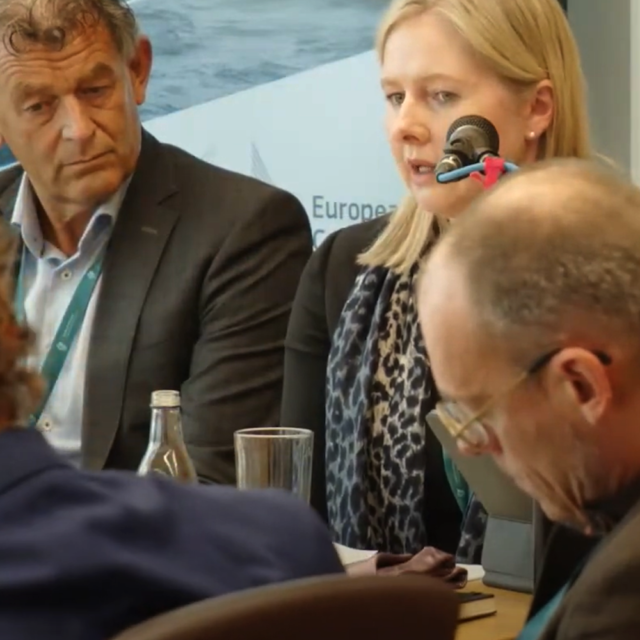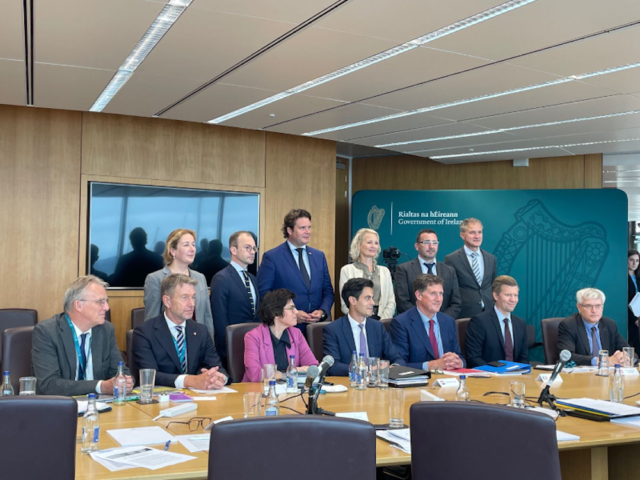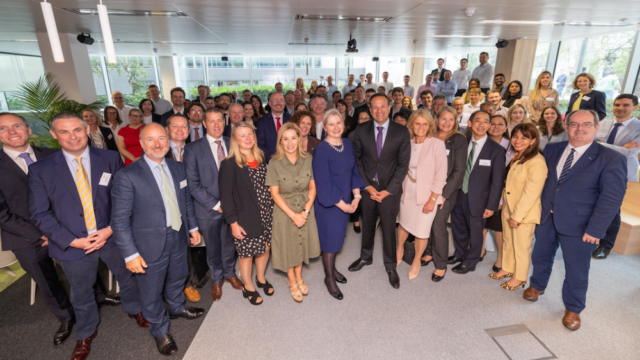Mainstream helps EU ‘North Seas’ nations set 260 GW offshore ambition
Category
Events
Date
20 September 2022
Location
Ireland
Mainstream’s Group Chief Executive, Mary Quaney, outlined key policies required to build offshore wind capacity during a landmark meeting at which nine European Union nations and the European Commission announced a significant increase in deployment targets.
Energy Ministers representing members of the North Seas Energy Cooperation (NSEC) grouping agreed to install at least 260 GW of offshore renewable energy across the regional maritime area by 2050 when they convened with the European Commissioner for Energy, Kadri Simson, in Dun Laoghaire, Ireland, last week.
If fully realised, the commitment by Ireland, Belgium, Denmark, France, Germany, Luxembourg, Norway, Sweden and the Netherlands would amount to more than 85% of the 300 GW of offshore generating capacity that the EU is intent on building out over coming three decades.

Mainstream’s Mary Quaney shares insights on supply chain challenges that must be overcome in order to deploy 260 GW of offshore wind capacity across Europe’s North Seas by 2050
The NSEC also set intermediate deployment targets – 76 GW by 2030 and 193 GW by 2040 – and pledged other policy actions after hearing the recommendations of invited offshore wind industry leaders.
In the opening panel session, Mainstream CEO Quaney described such clear visibility on the coming project pipeline as a key requirement for developers, giving their supply chains confidence to invest and build appropriate capacity.
And she added: “Targets for the North Seas need to be followed up with concrete action plans. Countries that take a holistic view and are more interventionist in policy and financial mechanisms to support necessary pipelines will likely see the better local content benefit.”
“I would caution against looking at the number of gigawatts in development and translating that into delivery, because unless the supply chain challenges can be addressed then that simply will not be sustainable in the timeline which we have to do so.
“These are all absolutely core and interlinked with the level of capital, which is quite significantly investing in development, but that capital will only be patient up to a certain point in time.”
Quaney also identified floating wind as having a “very significant role” in achieving deployment ambitions, with the North Seas region’s existing oil and gas expertise giving it an advantage that could be unlocked “with the alignment between energy, industrial, trade and financial policies”.
Smart, joined-up policy mechanisms will enable local investment in infrastructure and in jobs, which will enable much more timely development cycles to bring projects through into construction and operation.
Mary Quaney
Group CEO of Mainstream Renewable Power
She said: “With collaboration between industry, governments and supply chain, I believe that the opportunity is there to gain early mover advantage in the establishment of a commercialised floating offshore wind sector.
“Smart, joined-up policy mechanisms will enable local investment in infrastructure and in jobs, which will enable much more timely development cycles to bring projects through into construction and operation.”
The comments were echoed by fellow panellists Jochen Eickholt, CEO of Siemens Gamesa, Sif Group chief executive Fred Van Beers and Tim Meyerjürgens of the electricity transmission system operator TenneT.

Energy Ministers from nine countries at the NESC meeting in Dun Laoghaire, Co Dublin. Image: Mary Quaney
A joint NSEC statement later included a pledge to “continuing constructive engagement with industry and other stakeholders”, in order to overcome the “considerable supply chain bottleneck challenges currently impacting developers of offshore renewables projects, which could undermine the ability to meet our ambitious offshore energy goals.”
It continued: “Ministers and the Commissioner acknowledge the main barriers expressed by industry, including supply chain disruptions, and the financial stress faced by segments of the offshore supply chain. They further note the importance that is attached by industry to transparent and ambitious long-term national and regional offshore deployment targets, as well as regional coordination of future offshore auction timetables and the benefits of harmonized tender design.
“NSEC highlights that today’s announcement of respective offshore deployment targets for 2030, 2040 and 2050, together with its continuous work on cooperation and sharing of best practices, will be beneficial for the EU’s offshore supply chain.”


